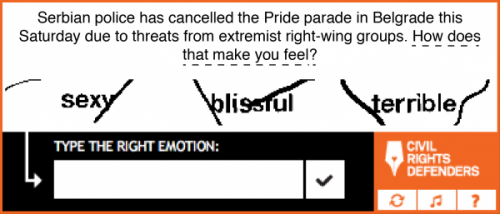October 9, 2012 report
CAPTCHA evokes sympathetic (aka correct) response

(Phys.org)—CAPTCHAs by definition (stands for Completely Automated Public Turing Test to tell Computers and Humans Apart) are gotcha tools that are used to spot automated-attack attempts posing as people. CAPTCHA programs are designed to plant character strings as entry codes, asking Internet sign-up users to repeat the string of letters to confirm the users are humans. The CAPTCHA in a broader sense protects websites against bots by generating and grading tests with distorted characters, tests designed for humans to pass and for machines to fail. A CAPTCHA image shows a random string. Then the user types it back to enter a site or to submit a form.
The idea is that a computer trying to do so would have problems with character recognition, especially if the string were to appear very distorted. Now a human rights group has come up with a new CAPTCHA with a twist. Sweden-based Civil Rights Defenders, a human rights organization, is offering a CAPTCHA in English and Swedish that presents a question about some situation that is representative of gross violations of human rights. The question asks how the user feels about it with three optional answers. The one-word answers to such questions describe approving or disapproving emotional states, words like: "fascinated," "euphoric," "wounded," "fearful."
Founded in 1982, Civil Rights Defenders this year wanted to come up with a CAPTCHA that not only uses "compassion" to tell humans from robots but also, in the process, raises global awareness about civil rights issues. Instead of just decoding an image of distorted letters, the user must take a "correct" stand toward statements that describe the group's chosen examples of human-rights abuses. Users pick the one word that best matches how they feel about the situation. Only one answer is "correct," the answer that proves the user is bothered by the rights abuse being described. "Now everyone can take a stand for human rights and challenge their visitors by installing the CAPTCHA on their blog or website," said Civil Rights Defenders.
News of the free CAPTCHA download has generated responses that it is an imaginative way of informing the public about human rights issues but the program may not exactly win first prize in the security race to outsmart machine bots.
Learning how to pick the correct emotion may not be impossible from a limited set of options. Writing on Naked Security, the Sophos security blog, one comment was that: "at the moment there seems to be a very limited selection of questions - and all the ones I saw required a negative response. Wider gallimaufry [jumble] of questions for web users to ponder - both negative and positive - would probably be a more effective challenge for automated bots."
More information:
phys.org/news/2011-11-stanford … t-captcha-codes.html
www.civilrightsdefenders.org/n … tects-human-empathy/
captcha.civilrightsdefenders.org/
© 2012 Phys.org

















